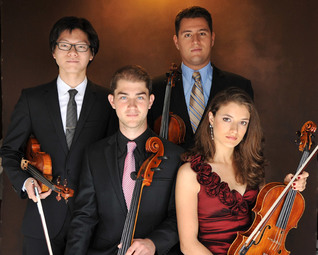 Dover String Quartet.
Dover String Quartet. But would I attend a concert by the Beethoven Quartet Society? I’m not so sure. As much as I love Beethoven, I’m wary of musical events that offer too much of a good thing.
The Dovers – a young quartet currently in residence at Chicago’s Northwestern University – turned heads, especially in Canada, a few years ago when they won all the prizes at the 2013 Banff International String Quartet Competition. It’s no wonder the critically acclaimed ensemble was greeted by an near-capacity audience in Walter Hall.
Opening with Op. 18 No. 4, the Dovers wasted no time in showing their strengths. Their playing was bright, bold and energetic. As well, they performed with a solid unity of purpose (even though, individually, they all have quite distinctive tone-qualities). And adding to the richness of their playing was a keen attention to inner voices. As well, I noticed a fondness for emphasizing off-beats, giving the Dovers’ interpretations a perky, syncopated quality.
All this was admirable. But there were problems, as well. Sometimes – in the harmonically ambiguous opening of the Op. 59 No. 3 quartet, for example – they failed to agree on intonation, with their differences threatening to become a tug-of-war. And in their efforts to produce an exciting, edgy sound, their tone could sound forced and raspy.
The result was a rough-hewn, funky kind of Beethoven, highly emphatic when it wasn’t over-emphatic. As the evening progressed, I started to wonder if the Dovers have ever met a musical idea they weren’t determined to milk to its last drop of effect.
This approach worked well in movements where this sort of playing was simpatico with Beethoven’s writing. For instance, it lent a striking brilliance to the fugato finale of Op. 59. No 3. On the other hand, movements that would have benefited from a touch of subtlety and restraint – such as the second movement of the Op. 59 No. 3 – could be blunt and overwrought.
Op. 132 also had its ups and downs. I enjoyed the shape-note simplicity of the third movement, with its gradual intensification to a climax. But by the time the last movement arrived – more than two hours after the Dovers first sat down to play lots of Beethoven – the group sounded slap-dash and harsh. The presto section was too much like a race, with the players furiously striving for the finish-line.
And this brings me back to my original point – that big programs devoted to one single composer can become endurance tests, both for performers and listeners.
The Dover String Quartet is a young ensemble. I hope, as the years go by, they’ll mature and develop a more refined style, with a broader palette of colours and nuances. I’d like to hear them again in a few years – preferably in a mixed program.
© Colin Eatock 2016
 RSS Feed
RSS Feed

